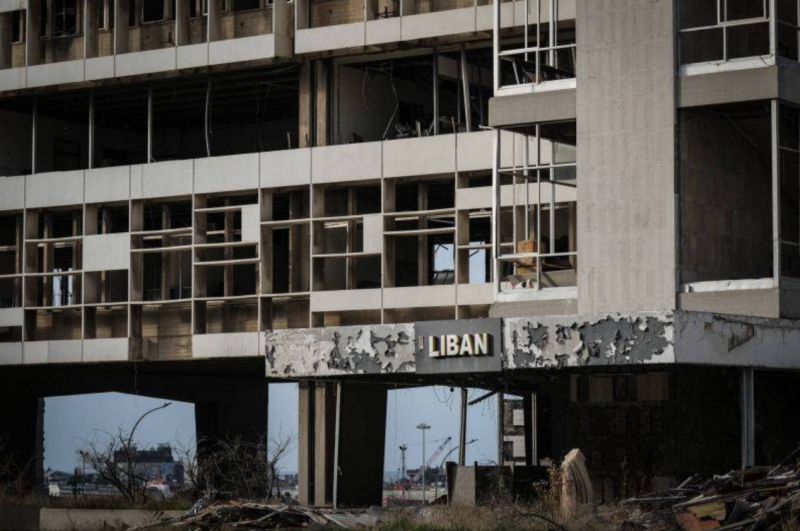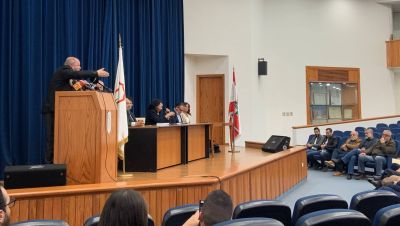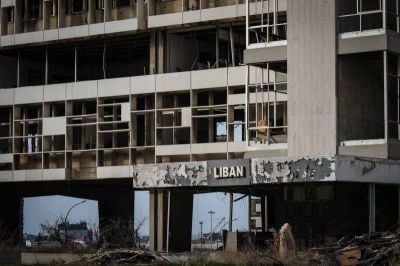
EDL's devastated headquarters in Beirut (Credit photo: Joao Sousa/ L'Orient Today)
BEIRUT — After months of open-ended strikes over poor pay in Lebanon’s public administrations, the government appears to be pushing civil servants to return to work.
Nisrine Machmouchi is president of the Civil Service Board, the central human resources agency of the state. She says the public sector is stuck in a vicious cycle. Without employees going to work, ministries that generate revenues for the state through tax collection, or selling services, aren’t able to bring money to the treasury, leaving the state less and less able to pay its employees.
“The administration needs to get moving a little so that it can collect revenues. When revenues come in it will bit by bit affect the situation,” she tells L’Orient Today. That would mean returning to work despite all the difficulties civil servants are facing, including, she points out, the continued inadequacy of the government-mandated transportation allowance.
Carrot and stick
On April 18, the caretaker cabinet passed Decree No. 11227 issuing temporary pay bonuses to public sector workers, effective as of May 2023. This grants public sector workers (excluding staff at overseas diplomatic missions) a bonus equal to four times their salary as of Jan. 1, 2020 (adjusted for promotions and seniority earned in the meantime) provided the temporary bonus is at least LL8 million monthly. Military personnel receive a bonus of three times their salary with a minimum of LL7 million and public sector pensions are also tripled.
These bonuses are on top of the supplementary pay legislated in the 2022 budget law. To illustrate, a typical civilian public servant whose salary is LL2 million receives a bonus of LL4 million under the 2022 budget law, and will get a bonus of LL8 million under the new decree, for a total of LL14 million ($148 at the current parallel market rate). Civil servants have access to an unfixed but slightly better exchange rate than the general public which would make those LL14 million equal to $162 if exchanged at the current civil service rate, before taxes.
But unlike the 2022 budget law passed last November, this latest decree comes with a catch. For a worker to benefit from the increased compensation, they must attend work for the full official working hours at least 14 days per month. Any other working days they miss out of the approximately 20 that occur in a typical month will be deducted from their bonus pay.
Official working hours are 8 a.m.-3:30 p.m. Mon-Thurs and 8 a.m. - 1 p.m. Friday.
Every employee who doesn’t come to work at least 14 days without having a legally valid excuse such as sickness, will be referred to the Central Inspection and will lose the full value of the compensation.
Transportation allowances, which were increased to LL450,000 per day of attendance in a separate decree which was also issued on April 18, will be paid on the same conditions.
Nawal Nasr, head of the Public Administration Employee’s Union, says this condition was put in place to force employees back to work and end the ongoing, months-long strike affecting most public administrations.
Nasr calls the condition “illegal, unconstitutional, and incongruous with the personnel system.”
“Give the employee his rights — a salary sufficient for a dignified life, an adequate transportation allowance, medical care and hospitalization when needed, and the social and educational benefits owed him — and then he will adhere to all his duties stipulated by law, including attendance throughout the official working hours, and there is no need to set conditions,” she says.
Workplace technology
To enforce this condition, the April decree instructs administrations to monitor attendance using electronic fingerprint scanners to register and record each employee’s arrival and departure from work. Administrations that do not own such devices are required to acquire them as soon as possible, without specifying a deadline. In the meantime, written attendance schedules signed by the director general will be accepted.
The rationale behind the fingerprint scanners is to ensure that there is no human interference in attendance records, says Machmouchi. Handwritten attendance records have proved not to be “100 percent precise,” she adds.
Machmouchi says such mechanical attendance tracking is nothing new in the state, pointing to a 1962 law that established a punch-card system of attendance tracking across the public sector.
“There is no doubt that dedicating the hours of the employee for the benefit of the administration is one of the main goals that every administrative organization aims at and compliance with it reflects the good discipline and conscientiousness of employees in service as well as the authority of the superiors and their vigilance over the public interest,” reads the 1962 law.
“And since some employees from different grades in the central units and governorates do not adhere to the official working hours, it necessitates adopting the necessary methods to address this situation,” it continues.
Administrations were mandated by the 1962 law to purchase punch-card clocks that stamped entry and exit times on cardboard cards.
More recently, fingerprint scanning devices were being adopted by a number of administrations prior to the economic crisis, said Machmouchi.
“This is not something new for the Lebanese public sector, that you would have fingerprint scanners or an electronic system to confirm attendance or to confirm arrival in the morning and leaving work in the evening.”
Nasr said the use of fingerprint devices has been growing throughout administrations for over 20 years and they are now present in “most” central government administrations. The new decree, however, also covers public establishments, independent authorities and municipalities.
It is not known how many central and municipal public sector offices have such devices. The Central Inspection is required by Decree No. 11227 to deliver a report to the prime minister on the status of fingerprint scanners across the public sector by mid May and did not respond to requests for comment from L’Orient Today.
For administrations that do not already own scanners, Nasr pointed out that far from being in a good position to acquire new devices, they are currently barely able to tread water. “The administrations lack ink, paper, and the simplest needs,” she said.
Orient Institut Beirut researcher Pierre France, who studies Lebanese bureaucracy, believes that purchasing fingerprint scanners is akin to putting “the cart before the horse,” at a time when electricity is frequently interrupted and “all the offices are still running on computers, and UPS [uninterruptible power supply] dating back from 2000-2010, at best.”
“It seems to point at the civil servants' responsibility as if they are to blame for not being able to have enough money to go to work at a place where there isn't enough electricity to work,” he added.
Machmouchi is well aware of these challenges. She said that her own department is severely underfunded: it has just six working computers and, since the Aug. 4, 2020 Beirut Port explosion, no servers. This means the human resources system of the entire state is operating off a desktop computer. When speaking to L’Orient Todaye, she was sitting in her office without electricity. And yet, she said, fingerprint scanners are not a major cost impediment, so long as there is the will to implement the decree.
L’Orient Today visited a local security devices seller in Dawra who said a typical fingerprint scanner costs $70 at retail and could wholesale for around $60. It would need a backup power source like a UPS to keep running in the event of a power cut and requires at least a wired connection to a computer which would be fed data.
“There are some people who say I’m strict but I cannot be anything else,” Machmoucheh told L’Orient Today.
“Crises give birth to challenges and if we don’t work now, we won’t ever work in our lives. I’m always saying to them we have an opportunity these next two months to prove that the public sector is able to work a little and bring in revenues. If we don’t succeed in these two months we’re headed towards very painful subsequent steps. If the administration doesn’t work.”
A new committee
It is unclear what the outcome of the apparent push to end the public sector strike with conditional bonuses will be, but some of the discussions around next steps will likely take place inside a new committee.
Nasr said that the union felt that multiplying all salaries by four exacerbated differences in salaries across the public sector—the bonus being much larger for those who were already higher paid compared to those starting from a lower salary.
“Our vision was to redistribute the temporary compensation so as to secure the principles of sufficiency and justice for those with small salaries,” she said.
So in a meeting on April 28, following the publication of the April 18 decrees, she met with caretaker Prime Minister Najib Mikati, Machmouchi, and caretaker Labor Minister Mustafa Bayram.
Following the meeting, Mikati issued a decision establishing a new committee to “work on studying the increases provided to the public sector,” per the language of the decision.
The committee’s remit also includes “reactivating work in public administrations, and proposing measures to reform the public sector.” The committee is chaired by caretaker deputy Prime Minister Saadeh Chami and includes Bayram, Machmouchi and Nasr, alongside the head of the central inspection, representatives from the finance ministry and Banque du Liban, and high-ranking cabinet advisors.

